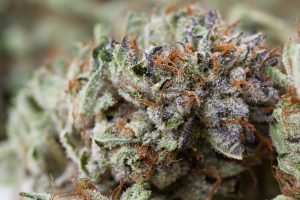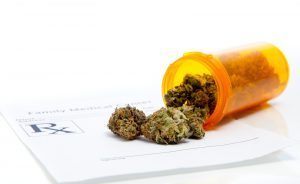When you have an illness, your doctor writes you a prescription. You bring your prescription to a pharmacy, which measures out your medication and sends you home with your prescribed treatment. This process is similar for medical marijuana, with one key difference: the pharmacy is replaced by the dispensary.
Due to the somewhat controversial nature of medical Cannabis, the role of the dispensary is poorly understood, and is frequently misrepresented in the media. This article will explain how dispensaries become licensed in Massachusetts, cover the current status of some applicant organizations, and talk about product pricing.
If you have any questions about the Massachusetts medical marijuana program, or think that you or a loved one might be a suitable candidate for treatment, we encourage you to call Inhale MD at (617) 477-8886 to set up a confidential consultation.

How RMDs Get Licensed to Sell to Patients
Massachusetts used to observe convoluted licensing requirements, which resulted in lengthy delays to the opening of the state’s first dispensaries. Alternative Therapies Group (ATG) in Salem, which finally debuted on June 24, 2015, was the first Massachusetts dispensary to open its doors to the public – nearly three years after the state approved marijuana for medical use.
Fortunately, the Massachusetts Department of Public Health (DPH) introduced a streamlined dispensary registration process on May 15, 2015. While only time will tell for certain, these revisions should allow compliant dispensaries to become registered more rapidly than was possible in the past.
No dispensary may legally operate without first being approved by the DPH. Summarized down to its general points, here’s what the process entails:
- A non-profit organization which wants to become a dispensary sends an application to the DPH for review.
- Applications are accepted year-round on a rolling basis.
- Dispensaries cannot simply open at will wherever they wish. They must obtain a “letter of support” – or at least “non-opposition,” i.e. neutrality – from the town or city where they plan to open for business.
- Applications include multiple components detailing how the dispensary intends to operate, such as an Application of Intent, a Character and Competency Form, and a Management and Operation Profile.
- If the application is accepted, the DPH grants the applicant a formal Certificate of Registration.
- Once the applicant obtains its Certificate of Registration, it becomes a Registered Marijuana Dispensary (RMD).
- The dispensary must also obtain approval to sell. The date of certification and date of approval to sell are not always the same, as we will explain shortly.
Where Are the Dispensaries in Massachusetts Located?
As of August, 2015, ATG in Salem is the only RMD in Massachusetts approved to sell medical Cannabis. ATG was granted its Certificate of Registration on December 31, 2014, and was approved for sales on June 23, 2015, the day before it opened. ATG is located at:
50 Grove St.
Salem, MA 01970
(978) 594-5728
ATG is exclusively a retail location, and does not grow marijuana on-site. ATG’s medical Cannabis is cultivated at a separate facility in Amesbury. Hours of operation are “by appointment only,” according to the ATG website.
A second dispensary called New England Treatment Access (NETA) is scheduled to open two locations in the fall of 2015: one in Northampton, and one in Brookline. NETA – Northampton was certified on April 3, 2015, but has not been approved to sell as of August, 2015. The Brookline location has not been certified or approved to sell as of August, 2015. NETA – Northampton will be a retail-only location, while its products will be cultivated in Franklin.
Other dispensaries which have been certified but not approved for sale (as of August, 2015) include the following:
- Central Ave. Compassionate Center, Inc. – Ayer location (retail and cultivation) certified May 20, 2015
- In Good Health, Inc. – Brockton location (retail and cultivation) certified April 24, 2014
So why are some dispensaries are certified, yet still not approved to sell? The answer lies in the process the DPH uses to review applicants.
The average RMD needs anywhere from 210 to 540 days to complete their paperwork and preparation, while the DPH needs another 38 to 79 days on average (though sometimes overlap occurs). The RMD needs to figure out how issues like zoning, licensing, permitting, occupancy certification, and financing will be handled, all of which can lead to “significant delays” as acknowledged by the DPH.
Once the applicant receives formal certification, they can start cultivating marijuana, but not selling it. The DPH must complete an additional inspection in order for sales to be approved. Even then, the DPH continues to conduct two inspections per month — one announced inspection, and one surprise inspection.
Please note Inhale MD is not a dispensary, and is not affiliated with any of the aforementioned organizations. This article is intended purely as an informational resource for registered patients seeking contact information for RMDs in Massachusetts.

How Much Do Cannabis Products Cost?
Once a patient is approved for Cannabis, it’s time to tackle the logistical considerations – for instance, “How much is this going to cost me?”
Unfortunately, there is no cut-and-dried answer to that question, for reasons which are described below:
- Each patient has different medical needs. Two individuals with an identical condition of similar severity may require very different prescriptions based on factors like height, weight, metabolism, underlying medical conditions, and sensitivity to the active ingredients in marijuana.
- Patients will inevitably prefer different methods of administration, which can lead to considerable differences in how much money patient has to spend on their medicine. Some routes of administration are simply more efficient, and therefore more economical, than others.
- Please be advised that products derived from Cannabis, such as edibles, tinctures, oils, and skin creams have significant risks associated from issues like inaccurate labeling, minimal efficacy, and can even pose health risks (e.g. combusting oils). We strongly advise patients to exercise caution with these products. Vaporized Cannabis flower (aka bud) or concentrates (aka wax, shatter, or generally, dabs), which are better understood by the medical community, have the efficacy and safety you need. Edibles can be very helpful for certain conditions, but have been shown to vary widely in their actual medication content, and therefore should be used with caution.
- It simply isn’t legal for dispensaries to publicly release their prices on their websites, nor are dispensaries allowed to disclose exact or even ballpark prices to curious consumers who call or email with questions. In order to get the price of a product, you must (1) be a registered patient, meaning you already have a Massachusetts Medical Marijuana Card, and (2) arrive at the dispensary in person.
Medical marijuana has helped countless patients manage their symptoms and enjoy a greater degree of physical comfort in their everyday lives. If you’re living with chronic pain, chronic insomnia, cancer, arthritis, anxiety, ALS, depression, MS, glaucoma, HIV/AIDS, or are undergoing chemotherapy, medical Cannabis could be right for you. Call Dr. Tishler at (617) 477-8886 to start discussing your medical needs in a confidential consultation.
MA specifically qualified conditions:
- Cancer
- Glaucoma
- Acquired immune deficiency syndrome (AIDS) or HIV positive status
- Hepatitis C
- Amyotrophic lateral sclerosis (ALS)
- Crohn’s disease
- Parkinson’s disease
- Multiple sclerosis
And other debilitating conditions as determined in writing by a qualifying patient’s physician, which may include:
- Chronic back pain
- Rheumatoid Arthritis
- Insomnia
- Anorexia
- Anxiety
- Depression
